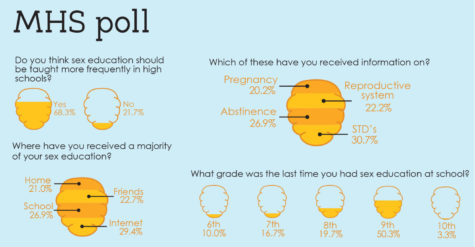Texas schools teaching less sex education after removal of Health class requirement

According to a recent study conducted by the Texas Freedom Network, 25 percent of public schools in Texas don’t require sex education at all. If it is taught, Texas law requires that schools stress abstinence until marriage.
In LISD, Health is the only class that contains a specific curriculum over sex education that lasts a week long. However under the foundation graduation plan that was implemented in 2014, Health is no longer required to graduate.
While freshman Biology covers the scientific aspects of the reproductive system, it does not teach the sex education students would’ve received through Health.
To compensate for this, speakers from the 180 Degrees program visit freshman biology classes to provide students sex education through one 90 minute lecture. Statistics and resources from the crisis pregnancy center Real Options for Women are used to show students the positive effects of abstinence.
“Abstinence cannot fail,” 180 Degrees speaker Rich Shelton said. “A person can fail at abstinence, that’s different. But abstinence itself can’t fail.”
The program encourages teens to live a life of sexual integrity by discussing the consequences of premarital sex, and setting physical boundaries until marriage. Speakers discuss the emotional and psychological effects of teen sex, abusive relationships and sexting.
“Of course they’re promoting abstinence,” Biology teacher Christa Walters said. “[But] they also say if you choose not to be abstinent, these are some of the things that could happen.”
The 180 Degrees program does include information about contraception such as their failure rate and the uncertainty that comes along with using them, but they don’t include facts about how to use them.
“Condoms are designed and made well but that doesn’t mean that they’re going to be perfect, and they can’t protect you from every STD that’s out there,” Shelton said. “Birth control can do a pretty good job of protecting girls from getting pregnant, but…it’s not going to protect her from an STD.” 
After the removal of the Health requirement, many students only receive their sex education through the 180 Degrees program. Senior Madison Lewis said she thinks the 180 Degrees program holds back information that should be available to students through an abstinence-plus form of sex education.
“It’s not realistic to think that scaring teenagers away from the idea of having sex will work,” Lewis said.
A 2008 study done by the University of Washington reported that teens who received  comprehensive sex education were 60 percent less likely to get pregnant, compared to teens who were educated with abstinence only curriculums.
comprehensive sex education were 60 percent less likely to get pregnant, compared to teens who were educated with abstinence only curriculums.
In 2012, school districts in Mississippi began gaining permission from parents to teach students through an abstinence-plus curriculum. This type of teaching includes more information on contraception, like how to use a condom and where to find them, but still strongly promotes an abstinence only lifestyle.
This same policy was adopted in Hawaii in 2015, and has caused a decrease in teenage pregnancies and in STD’s among teens.
“I would’ve loved learning through a program like that when I was younger,” Lewis said. “It would’ve been much more beneficial to me, to learn all that stuff through the school instead of having to learn it on my own.”









Okuse Marvellous • Apr 7, 2020 at 6:59 AM
I have been on this particular movie if sex education for long right from the beginning of season one to two. Not quite long the season 2 was released after hearing so many things about the movie review that the movie was banned. I just want to know if there will be releasing season 3 this year or next year. And I have also read through this article and I am so grateful for the update that you have posted right here, thanks.
https://www.tecteem.com/toxicwap-site/